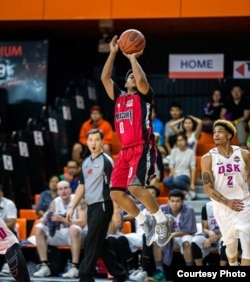To be a winning team, you’ve gotta have heart, and Cambodia’s National Basketball team ticks that box going into next month’s Southeast Asian Games in Kuala Lumpur, Malaysia.
The team will “play with a lot of heart,” team captain Pek Mith, 31, who plays center position, told VOA Khmer. “We got Cambodia on our back. We got to represent the people back at home at our motherland and it is back here also, in the U.S.”
Yet everyone involved with the Cambodian hoopsters acknowledges that a little more height would elevate their game at the Olympic-style multigame event, which allows teams to field foreign-born or foreign-raised players as long as they play for a parent’s native land.
As the team was forming for this year’s outing, organizers knew they could count on returning power forward Sophoeun Oeun, who at 6 feet 4 inches played professionally for Saigon Heat.
Watch: Cambodia Recruits Cambodian-Americans to Boost National Hoops Team
But instead of a lone palm, the Cambodians wanted a grove, and instead of just playing, they wanted a medal, which would be nice to have in hand when Cambodia hosts the Games in 2023. In a perfect world, the Cambodians visualized that first medal as a gold, won by crushing the Philippine team, the top dogs since the games began in 1977 except for 1989 when Malaysia took the top spot.
So Cambodia’s short but mighty organizers recruited 10 ball players — nine from the U.S. and one from Canada with a range of 5 foot 5 inches to 6 foot 4 inches — who will help the 12-person team at the games, which are held every two years in one of 11 Southeast Asian countries.
Heart vs. height
Rayvon Fouché, associate professor and director of American Studies of Purdue University, told VOA Khmer that the history of American sports demonstrated that winning teams are driven by individual “effort and desire.”
“And I think heart matters a lot,” he said.
Fouché’s research on the relationship between sports, technology and culture in the 21th century revealed that teams with mediocre players and a higher purpose very often beat teams that just have talented players: “That’s why culture and community and identity within context of sports is really important.”
“And that’s why people love the SEA Games and Olympics because playing and competing for your nation with people who have the same identity and culture — that makes you play in a way that you probably wouldn’t play before,” he added.
National pride
In 2007, Sophean Toun, 31, a guard, was the first Cambodian-American player on the Cambodian National team. He says national pride encourages foreign-born players to compete.
“I feel like it’s our job to represent our ways in basketball to fulfill that pride that everyone should have being Cambodian,” he said.
Developing that pride is one reason Sokhary Chau, 44, who manages a Boston law office, is now president of the newly formed USA-Cambodian Basketball Association in Lowell, Massachusetts. He’s tapping Khmer communities throughout the U.S. to help the Cambodian-American players who must pay their own way for a chance to compete at the biannual tournaments.
He sees basketball as a way to build strength in the communities.
“For people who play sports in general, they do better at school and they do better in life,” he said. “And they become leaders,” he added. “When they play, they think about good sportsmanship and how to produce team work.”
And competing at the games has another benefit: It transcends differences in the Cambodian communities, Chau said.
“Sports bring people together,” he said. “Doesn’t matter if you’re rich or you’re poor … you are cheering for your own team. In this case, we’re cheering for our country.”
Recruits aren't 'foreigners,' they are Khmer
Austin Koledoye, 50, a Nigerian citizen who has lived in Cambodia since 2007, is the team’s head coach.
It’s not uncommon for countries to seek the best athlete regardless of their nationalities, he said, adding that the players he recruited are not “foreigners” they are Khmer — and their involvement benefits Cambodia, which is now on the world basketball map. Khmer are the majority population in Cambodia.
“It has been a success story,” Koledoye said. “It was unthinkable 15 years ago.”
Fouché says players coming from the U.S. have clear advantages — they’re taller and better fed and better trained — factors that could lead to low morale in a mixed team.
Watch: Cambodia’s National Basketball Team Practices
“This is your nation, this is your culture, this is your identity, and then you have people” who lack a full “understanding of what it means to live in Cambodia or another place show up and say, ‘Now I’m representing the national team,’ yeah, that has a horrible implication for morale.”
But Sok Tour, 30, a Cambodian native, in Phnom Penh, who retired after the 2015 SEA Games and is now a coach for the Cambodian Basketball League Under 17, says there was no resentment toward the foreign-born players.
“The Cambodian players here are limited in their skills,” he said. “When we compete to represent Cambodia, we want Cambodians from the U.S. because of their expertise in the game. We want experience and we need their help.”
Koledoye says that the Cambodian-Americans are not ringers, they’re role models for local Cambodians: “They leave their jobs and family to come and play,” he said. “That is Khmer spirit.”



